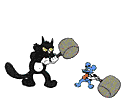Where do Hard Ds come from?
- ausdag
- Posts: 1881
- Joined: Sat Jul 24, 2004 7:14 am
- Please enter the next number in sequence: 1
- Location: Brisbane, AUSTRALIA
Where do Hard Ds come from?
Who knows the physics behind the existence of hard D? What factors go into its existence? I imagine it was purely accidental that it came about. I couldn't imagine any pipemaker thinking 'I'm going to invent a way of making the bottom note sound in two different ways'. More likely someone flicked their A gracenote onto low D and it gave a hint of hardness and so perhaps he went on to try and refine its existence. But what actually happens to the air column and reed head 'stature' to produce it?
Cheers,
DavidG
Cheers,
DavidG
David (ausdag) Goldsworthy
http://ozuilleann.weebly.com/
http://ozuilleann.weebly.com/
- Brian Lee
- Posts: 3059
- Joined: Tue Jun 26, 2001 6:00 pm
- antispam: No
- Please enter the next number in sequence: 8
- Location: Behind the Zion Curtain
- Contact:
David, check out this article...it might help to explain a little of what's happening:
http://www.tuftl.tufts.edu/mie/Pubs/uilleann_reed.pdf
http://www.tuftl.tufts.edu/mie/Pubs/uilleann_reed.pdf
-
David Lim
- Posts: 453
- Joined: Wed Oct 20, 2004 1:37 pm
- Please enter the next number in sequence: 1
- Location: Manchester UK
- Contact:
I have heard it is the bottom D attempting to overblow up an octave (as a whistle does) and for some reason failing to do so.
This failed overblow results in a new note (the hard D) with greater higher harmonic content than the proper bottom note (the soft D).
The bottom note will succesfully overblow again to its third mode producing a high A. Commonly referred to as a squeak.
David
This failed overblow results in a new note (the hard D) with greater higher harmonic content than the proper bottom note (the soft D).
The bottom note will succesfully overblow again to its third mode producing a high A. Commonly referred to as a squeak.
David
- ausdag
- Posts: 1881
- Joined: Sat Jul 24, 2004 7:14 am
- Please enter the next number in sequence: 1
- Location: Brisbane, AUSTRALIA
That's interesting because I have noticed that when I have a good reed, I can stop the chanter on my leg, lift it, and it will immediately play a hard D which I can repeat over and over - stacatto Hard D. On not-so-good reeds, stopping an lifting like this results in the high A 'squeak'. This suggests that the not-so-good reed is not capable of locking into this 2nd harmonic but goes straight to the third harmonic. Hmmmm...David Lim wrote:
The bottom note will succesfully overblow again to its third mode producing a high A. Commonly referred to as a squeak.
David
Cheers,
DavidG
David (ausdag) Goldsworthy
http://ozuilleann.weebly.com/
http://ozuilleann.weebly.com/
- ausdag
- Posts: 1881
- Joined: Sat Jul 24, 2004 7:14 am
- Please enter the next number in sequence: 1
- Location: Brisbane, AUSTRALIA
Thanks Brian, I'll have a reed..read... of it over a glass of homebrew stout tomorrow.Brian Lee wrote:David, check out this article...it might help to explain a little of what's happening:
http://www.tuftl.tufts.edu/mie/Pubs/uilleann_reed.pdf
Cheers,
DavidG
David (ausdag) Goldsworthy
http://ozuilleann.weebly.com/
http://ozuilleann.weebly.com/
- ausdag
- Posts: 1881
- Joined: Sat Jul 24, 2004 7:14 am
- Please enter the next number in sequence: 1
- Location: Brisbane, AUSTRALIA
You mean when a chanter and reed love each other very much?reedman wrote:Hard "D"'s come from "D Land" that is created under certain
pressures in the upper part of the chanter bore.
David (ausdag) Goldsworthy
http://ozuilleann.weebly.com/
http://ozuilleann.weebly.com/
- Brian Lee
- Posts: 3059
- Joined: Tue Jun 26, 2001 6:00 pm
- antispam: No
- Please enter the next number in sequence: 8
- Location: Behind the Zion Curtain
- Contact:
Ah now David, there are some who would take issue wit yerself for speaking such tings! As we all know the *proper bottom note* is in fact always a HARD D.David Lim wrote:...This failed overblow results in a new note (the hard D) with greater higher harmonic content than the proper bottom note (the soft D).
David
- Joseph E. Smith
- Posts: 13780
- Joined: Sat Mar 06, 2004 2:40 pm
- antispam: No
- Location: ... who cares?...
- Contact:
- Jessica Ventura
- Posts: 107
- Joined: Tue May 03, 2005 2:49 pm
- Please enter the next number in sequence: 1
- Location: Minnesota
- ausdag
- Posts: 1881
- Joined: Sat Jul 24, 2004 7:14 am
- Please enter the next number in sequence: 1
- Location: Brisbane, AUSTRALIA
I said 'do you speak a my language'....he just smiled and gave me vegemite sandwichJessica Ventura wrote:You mean they come from D Land down under?reedman wrote:Hard "D"'s come from "D Land" that is created under certain
pressures in the upper part of the chanter bore.
David (ausdag) Goldsworthy
http://ozuilleann.weebly.com/
http://ozuilleann.weebly.com/
- ausdag
- Posts: 1881
- Joined: Sat Jul 24, 2004 7:14 am
- Please enter the next number in sequence: 1
- Location: Brisbane, AUSTRALIA
That's reasonable theory. Given that to play a hard D you have to put the reed under more stress initially than with the soft D (the propper Dbillh wrote:but seriously folks
I think there's some question about whether it's a true "multiphonic" or not. My favorite pet theory about it is that it's a chaotic phenomenon, rapidly flipping between two modes.
DavidG
David (ausdag) Goldsworthy
http://ozuilleann.weebly.com/
http://ozuilleann.weebly.com/
- Donald E Baltus
- Posts: 75
- Joined: Fri Apr 29, 2005 3:27 pm
- Please enter the next number in sequence: 1
